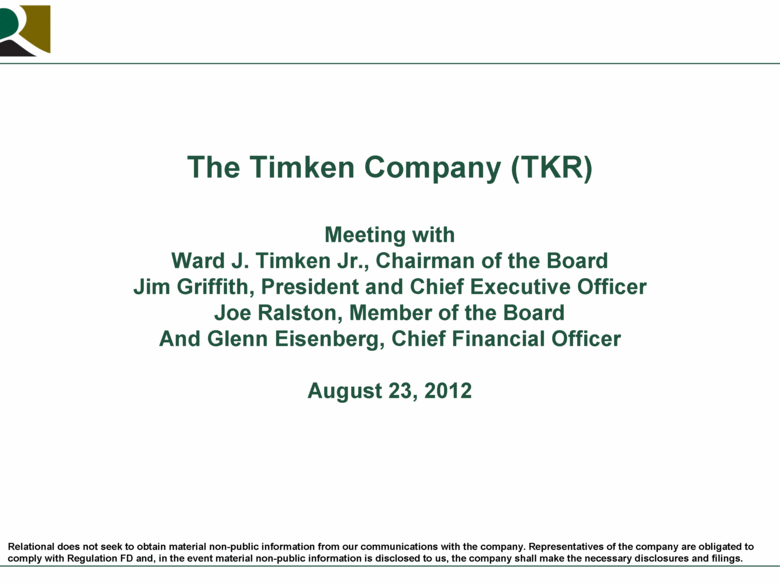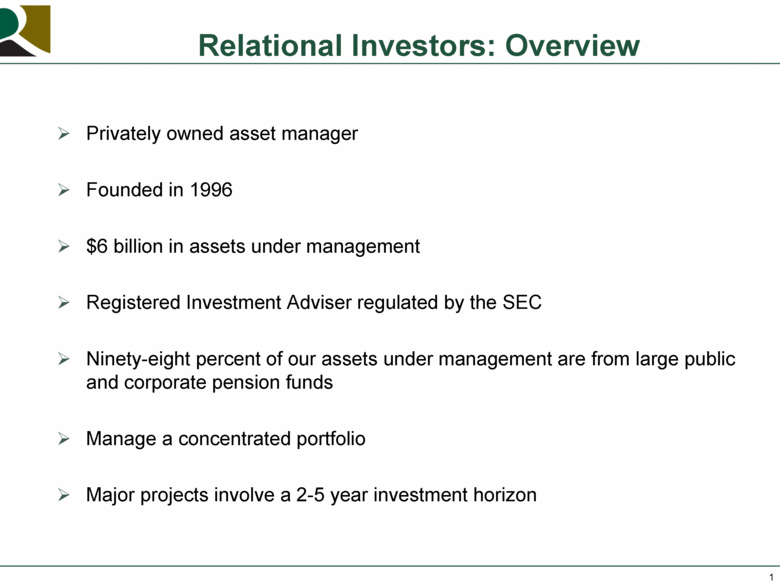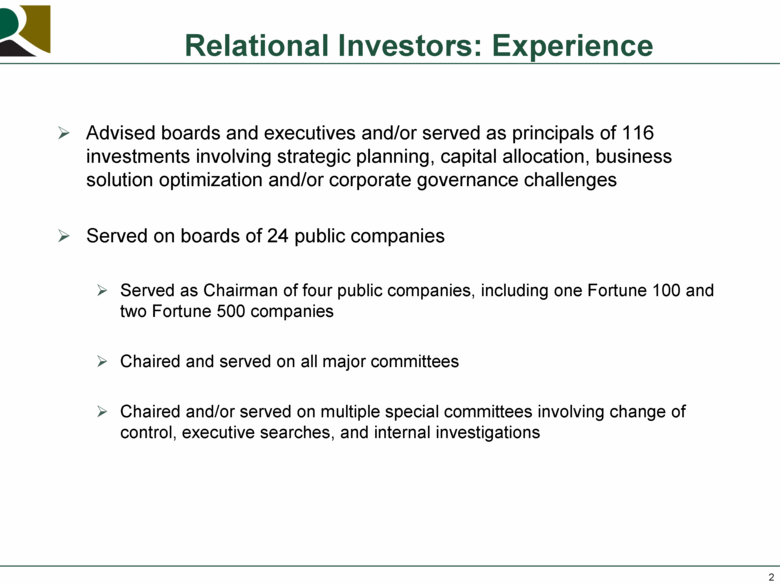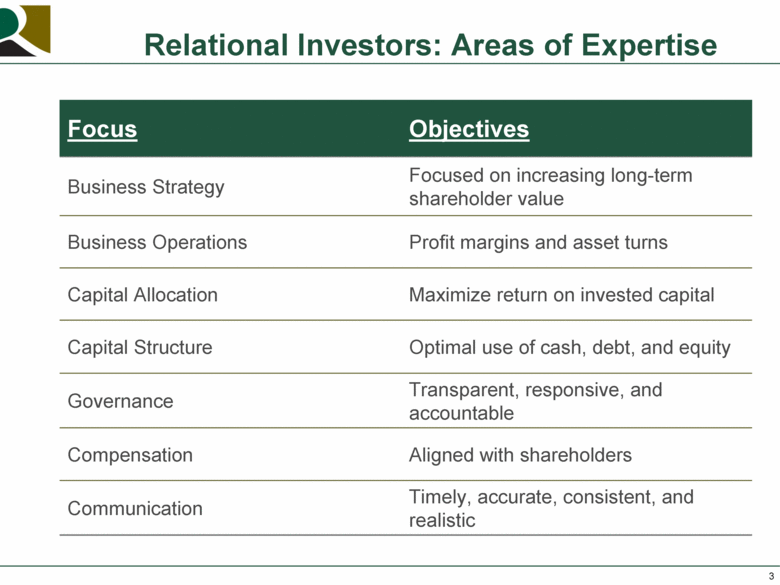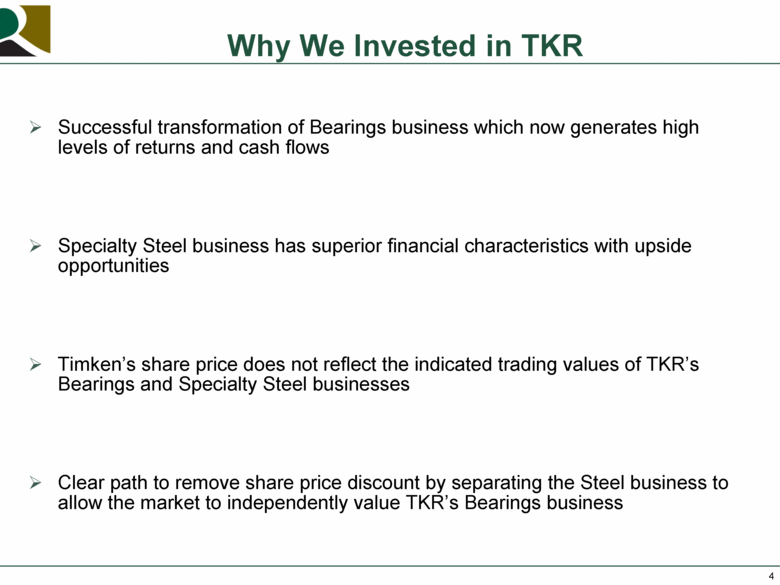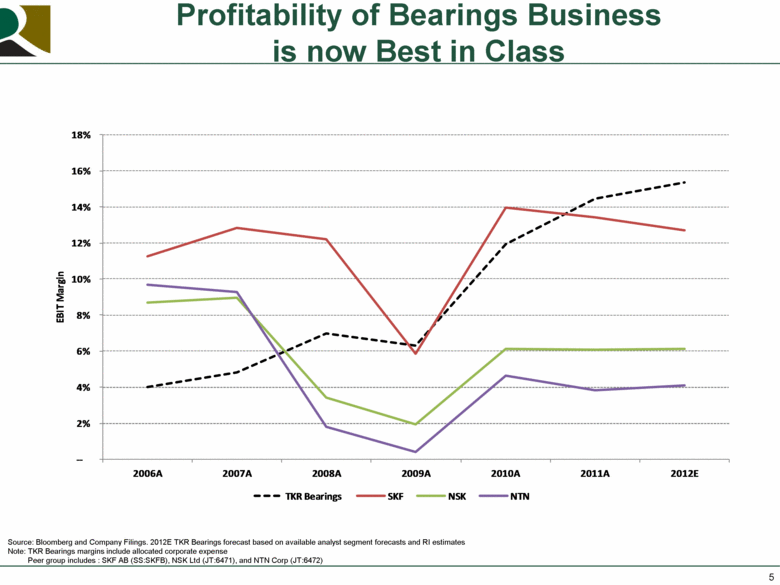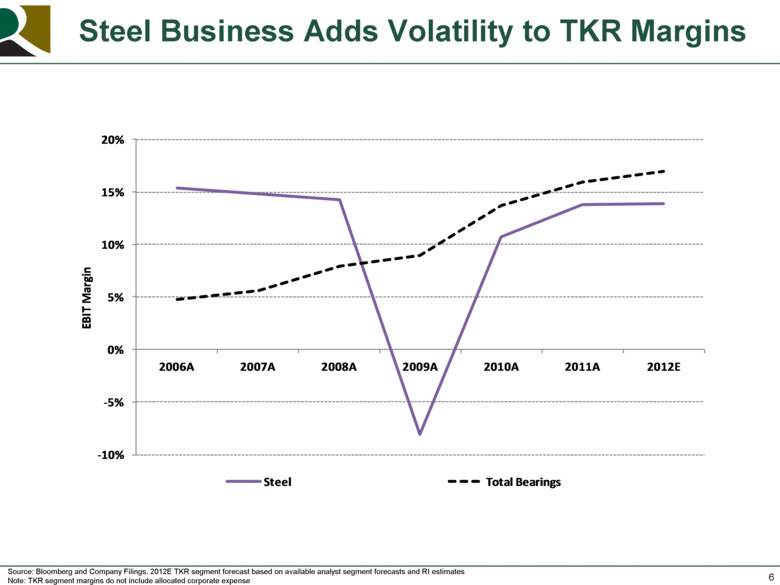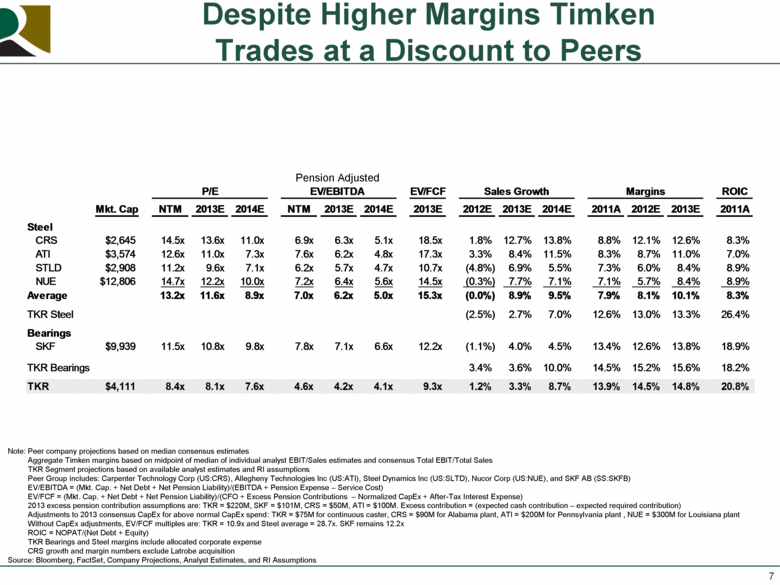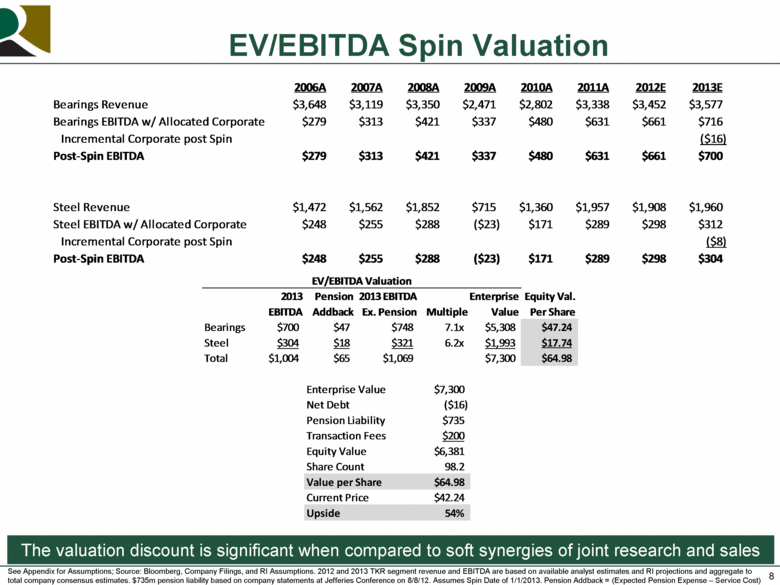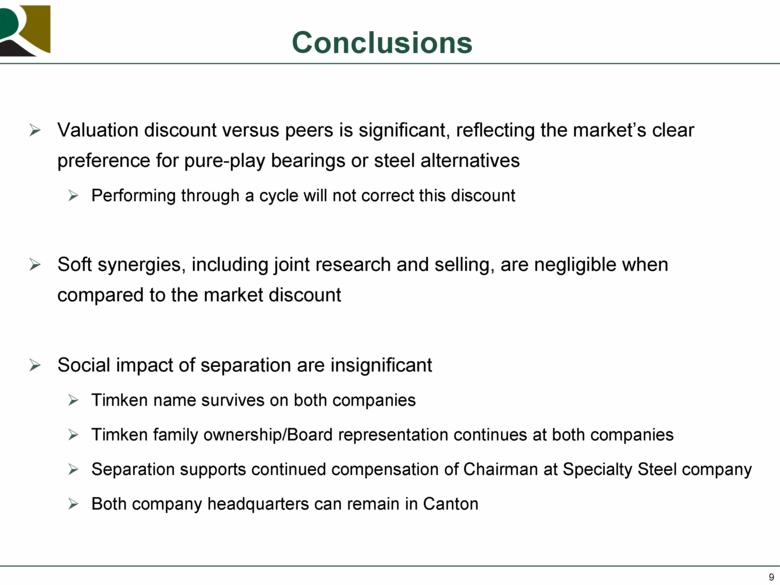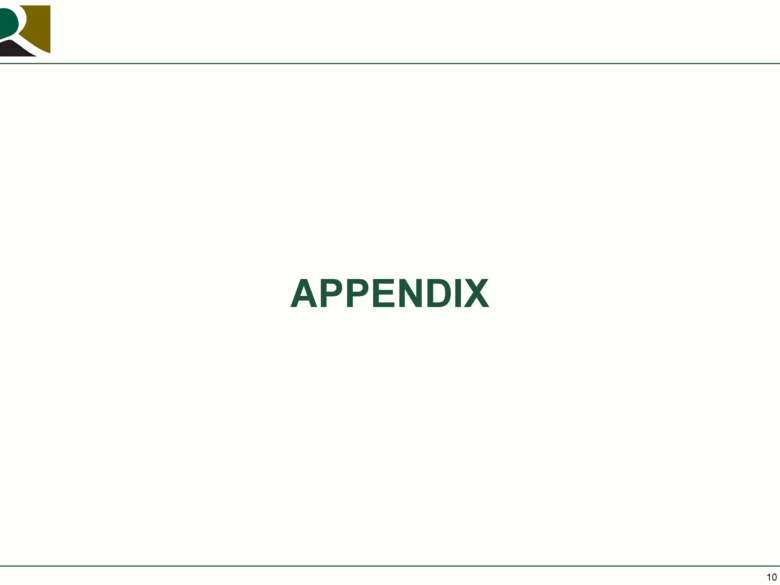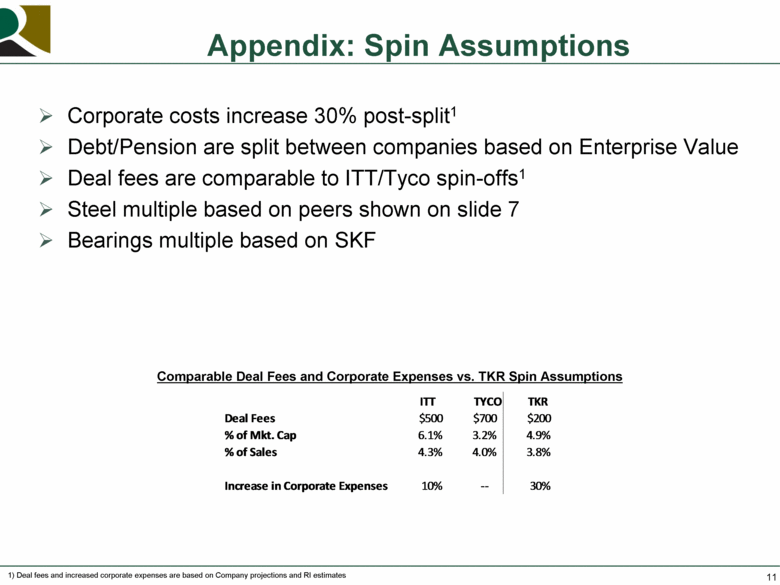PX14A6G Filing
UNITED STATES
SECURITIES AND EXCHANGE COMMISSION
Washington, D.C. 20549
NOTICE OF EXEMPT SOLICITATION
Name of the Registrant: |
| The Timken Company |
|
|
|
Name of the Person(s) relying on the Exemption: |
| 1. Relational Investors LLC |
|
| 2. Relational Investors Mid-Cap Fund I, L.P. |
|
| 3. Relational Investors Mid-Cap Fund II, L.P. |
|
| 4. Ralph V. Whitworth |
|
| 5. David H Batchelder |
|
| 6. California State Teachers’ Retirement System |
|
|
|
Address of the Person(s) Relying on the Exemption: |
| 12400 High Bluff Drive |
|
| Suite 600 |
|
| San Diego, CA 92130 |
|
|
|
|
| 100 Waterfront Place |
|
| MS 04 |
|
| West Sacramento, CA 95605 |
|
|
|
Written Materials: |
| 1. Presentation by Relational Investors LLC to Registrant |
|
| 2. Shareholder proposal sent by California State Teachers’ Retirement System to Registrant |
| The Timken Company (TKR) Meeting with Ward J. Timken Jr., Chairman of the Board Jim Griffith, President and Chief Executive Officer Joe Ralston, Member of the Board And Glenn Eisenberg, Chief Financial Officer August 23, 2012 Relational does not seek to obtain material non-public information from our communications with the company. Representatives of the company are obligated to comply with Regulation FD and, in the event material non-public information is disclosed to us, the company shall make the necessary disclosures and filings. |
| Relational Investors: Overview Privately owned asset manager Founded in 1996 $6 billion in assets under management Registered Investment Adviser regulated by the SEC Ninety-eight percent of our assets under management are from large public and corporate pension funds Manage a concentrated portfolio Major projects involve a 2-5 year investment horizon 1 |
| Relational Investors: Experience Advised boards and executives and/or served as principals of 116 investments involving strategic planning, capital allocation, business solution optimization and/or corporate governance challenges Served on boards of 24 public companies Served as Chairman of four public companies, including one Fortune 100 and two Fortune 500 companies Chaired and served on all major committees Chaired and/or served on multiple special committees involving change of control, executive searches, and internal investigations 2 |
| 3 Relational Investors: Areas of Expertise Focus Objectives Business Strategy Focused on increasing long-term shareholder value Business Operations Profit margins and asset turns Capital Allocation Maximize return on invested capital Capital Structure Optimal use of cash, debt, and equity Governance Transparent, responsive, and accountable Compensation Aligned with shareholders Communication Timely, accurate, consistent, and realistic |
| 4 Why We Invested in TKR Successful transformation of Bearings business which now generates high levels of returns and cash flows Specialty Steel business has superior financial characteristics with upside opportunities Timken’s share price does not reflect the indicated trading values of TKR’s Bearings and Specialty Steel businesses Clear path to remove share price discount by separating the Steel business to allow the market to independently value TKR’s Bearings business |
| Profitability of Bearings Business is now Best in Class 5 Source: Bloomberg and Company Filings. 2012E TKR Bearings forecast based on available analyst segment forecasts and RI estimates Note: TKR Bearings margins include allocated corporate expense Peer group includes : SKF AB (SS:SKFB), NSK Ltd (JT:6471), and NTN Corp (JT:6472) -- 2% 4% 6% 8% 10% 12% 14% 16% 18% 2006A 2007A 2008A 2009A 2010A 2011A 2012E EBIT Margin TKR Bearings SKF NSK NTN |
| Steel Business Adds Volatility to TKR Margins 6 Source: Bloomberg and Company Filings. 2012E TKR segment forecast based on available analyst segment forecasts and RI estimates Note: TKR segment margins do not include allocated corporate expense - 10% - 5% 0% 5% 10% 15% 20% 2006A 2007A 2008A 2009A 2010A 2011A 2012E EBIT Margin Steel Total Bearings |
| Despite Higher Margins Timken Trades at a Discount to Peers 7 Note: Peer company projections based on median consensus estimates Aggregate Timken margins based on midpoint of median of individual analyst EBIT/Sales estimates and consensus Total EBIT/Total Sales TKR Segment projections based on available analyst estimates and RI assumptions Peer Group includes: Carpenter Technology Corp (US:CRS), Allegheny Technologies Inc (US:ATI), Steel Dynamics Inc (US:SLTD), Nucor Corp (US:NUE), and SKF AB (SS:SKFB) EV/EBITDA = (Mkt. Cap. + Net Debt + Net Pension Liability)/(EBITDA + Pension Expense – Service Cost) EV/FCF = (Mkt. Cap. + Net Debt + Net Pension Liability)/(CFO + Excess Pension Contributions – Normalized CapEx + After-Tax Interest Expense) 2013 excess pension contribution assumptions are: TKR = $220M, SKF = $101M, CRS = $50M, ATI = $100M. Excess contribution = (expected cash contribution – expected required contribution) Adjustments to 2013 consensus CapEx for above normal CapEx spend: TKR = $75M for continuous caster, CRS = $90M for Alabama plant, ATI = $200M for Pennsylvania plant , NUE = $300M for Louisiana plant Without CapEx adjustments, EV/FCF multiples are: TKR = 10.9x and Steel average = 28.7x. SKF remains 12.2x ROIC = NOPAT/(Net Debt + Equity) TKR Bearings and Steel margins include allocated corporate expense CRS growth and margin numbers exclude Latrobe acquisition Source: Bloomberg, FactSet, Company Projections, Analyst Estimates, and RI Assumptions Pension Adjusted P/E EV/EBITDA EV/FCF Sales Growth Margins ROIC Mkt. Cap NTM 2013E 2014E NTM 2013E 2014E 2013E 2012E 2013E 2014E 2011A 2012E 2013E 2011A Steel CRS $2,645 14.5x 13.6x 11.0x 6.9x 6.3x 5.1x 18.5x 1.8% 12.7% 13.8% 8.8% 12.1% 12.6% 8.3% ATI $3,574 12.6x 11.0x 7.3x 7.6x 6.2x 4.8x 17.3x 3.3% 8.4% 11.5% 8.3% 8.7% 11.0% 7.0% STLD $2,908 11.2x 9.6x 7.1x 6.2x 5.7x 4.7x 10.7x (4.8%) 6.9% 5.5% 7.3% 6.0% 8.4% 8.9% NUE $12,806 14.7x 12.2x 10.0x 7.2x 6.4x 5.6x 14.5x (0.3%) 7.7% 7.1% 7.1% 5.7% 8.4% 8.9% Average 13.2x 11.6x 8.9x 7.0x 6.2x 5.0x 15.3x (0.0%) 8.9% 9.5% 7.9% 8.1% 10.1% 8.3% TKR Steel (2.5%) 2.7% 7.0% 12.6% 13.0% 13.3% 26.4% Bearings SKF $9,939 11.5x 10.8x 9.8x 7.8x 7.1x 6.6x 12.2x (1.1%) 4.0% 4.5% 13.4% 12.6% 13.8% 18.9% TKR Bearings 3.4% 3.6% 10.0% 14.5% 15.2% 15.6% 18.2% TKR $4,111 8.4x 8.1x 7.6x 4.6x 4.2x 4.1x 9.3x 1.2% 3.3% 8.7% 13.9% 14.5% 14.8% 20.8% |
| EV/EBITDA Spin Valuation 8 See Appendix for Assumptions; Source: Bloomberg, Company Filings, and RI Assumptions. 2012 and 2013 TKR segment revenue and EBITDA are based on available analyst estimates and RI projections and aggregate to total company consensus estimates. $735m pension liability based on company statements at Jefferies Conference on 8/8/12. Assumes Spin Date of 1/1/2013. Pension Addback = (Expected Pension Expense – Service Cost) The valuation discount is significant when compared to soft synergies of joint research and sales 2006A 2007A 2008A 2009A 2010A 2011A 2012E 2013E Bearings Revenue $3,648 $3,119 $3,350 $2,471 $2,802 $3,338 $3,452 $3,577 Bearings EBITDA w/ Allocated Corporate $279 $313 $421 $337 $480 $631 $661 $716 Incremental Corporate post Spin ($16) Post-Spin EBITDA $279 $313 $421 $337 $480 $631 $661 $700 Steel Revenue $1,472 $1,562 $1,852 $715 $1,360 $1,957 $1,908 $1,960 Steel EBITDA w/ Allocated Corporate $248 $255 $288 ($23) $171 $289 $298 $312 Incremental Corporate post Spin ($8) Post-Spin EBITDA $248 $255 $288 ($23) $171 $289 $298 $304 EV/EBITDA Valuation 2013 Pension 2013 EBITDA Enterprise Equity Val. EBITDA Addback Ex. Pension Multiple Value Per Share Bearings $700 $47 $748 7.1x $5,308 $47.24 Steel $304 $18 $321 6.2x $1,993 $17.74 Total $1,004 $65 $1,069 $7,300 $64.98 Enterprise Value $7,300 Net Debt ($16) Pension Liability $735 Transaction Fees $200 Equity Value $6,381 Share Count 98.2 Value per share $64.98 Current Price $42.24 Upside 54%
|
| Conclusions Valuation discount versus peers is significant, reflecting the market’s clear preference for pure-play bearings or steel alternatives Performing through a cycle will not correct this discount Soft synergies, including joint research and selling, are negligible when compared to the market discount Social impact of separation are insignificant Timken name survives on both companies Timken family ownership/Board representation continues at both companies Separation supports continued compensation of Chairman at Specialty Steel company Both company headquarters can remain in Canton 9 |
| APPENDIX 10 |
| Appendix: Spin Assumptions Corporate costs increase 30% post-split1 Debt/Pension are split between companies based on Enterprise Value Deal fees are comparable to ITT/Tyco spin-offs1 Steel multiple based on peers shown on slide 7 Bearings multiple based on SKF 11 Comparable Deal Fees and Corporate Expenses vs. TKR Spin Assumptions 1) Deal fees and increased corporate expenses are based on Company projections and RI estimates ITT TYCO TKR Deal Fees $500 $700 $200 % of Mkt. Cap 6.1% 3.2% 4.9% % of Sales 4.3% 4.0% 3.8% Increase in Corporate Expenses 10% -- 30% |
Proposal
Shareholders recommend that the Board of Directors and management act expeditiously, consistent with effective tax considerations, to engage an investment banking firm to effectuate a spin-off of Timken’s steel business segment (“Steel business”) into a separately traded public company.
Supporting Statement
CalSTRS, together with Relational Investors, a large shareholder, believes that the market significantly undervalues Timken due to its combination of two incongruent, core businesses and that a spin-off of the Steel business from the remaining business segments (collectively, “Bearings business”) would maximize shareholder value.
Based on the Company’s 2011 Annual Report filed on Form 10-K, Timken’s Steel business represents 37% of total revenues and 34% of operating income. We believe that a spin-off of the Steel business would fundamentally change the way the market values the overall business. Specifically, the Steel business would be valued and classified as a “materials” company and the Bearings business as an “industrial” company.
A spin-off of the Steel business would be consistent with actions taken by many major industrial companies.
Based on Timken’s financial disclosures, its Bearings and Steel businesses each compare favorably to peers as measured by return on invested capital, operating margins, and revenue growth; however, Timken’s valuation multiples are significantly discounted to peers in their respective industries. Separating the Bearings and Steel businesses would allow the market to value each business as a “pure play” in line with peer trading multiples in their respective sectors and eliminate existing misunderstandings of the assets by investors specializing in the different sectors.
The Company acknowledged this issue at an Investor Conference on December 6, 2011 (“2011 Conference”). Process Industries President, Christopher Coughlin, remarked: “[a]fter speaking with many of you, this [Steel business] is clearly the most misunderstood business within the Timken Company ...”
We believe that a spin-off of the Steel business would not destroy any existing synergies created by the integration. The Company has indicated that, “the steel that we make we use within our Bearing and Power Transmission Group. Having said that, we only use around 10% of what we make internally. So 90% is sold to a third party. So from that respect, if we were to exit the Steel business, we could arrange supply arrangements where we could be using the steel that we currently make ourselves.” (CFO, Glenn Eisenberg, 2011 Conference).
A spin-off transaction would allow both independent entities to remain headquartered in Canton, Ohio and, thereby, potentially create incremental corporate job opportunities as independently operated businesses.
The Company has suggested that improving returns and decreasing volatility in the Steel business will correct the trading discount. Mr. Eisenberg indicated at a recent conference that the key to improving Timken’s valuation is to improve returns across the economic cycle. Even if such improvements materialize, we believe Timken will still trade at a discount to its potential value as two independent companies due to the widely divergent business characteristics. Accordingly, we request that shareholders support this proposal.
